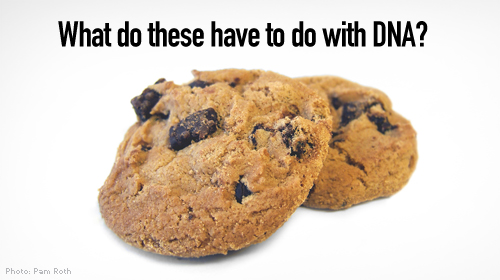Are Genes Patentable? An Insider's Review of the ACLU's Supreme Court Argument on Gene Patenting


In honor of DNA Day, celebrated on April 25, the ACLU gives you an insider’s take on our Supreme Court Argument on gene patenting.
Are human genes patentable? That is the question at issue in AMP v. Myriad Genetics, which the ACLU argued before the Supreme Court on Monday, April 15.
“One way to address the question presented by this case is what exactly did Myriad invent? And the answer is nothing.”
That is how my colleague, Chris Hansen, began his argument. For the next 20 minutes, Chris engaged in a spirited discourse with the Justices about genes and patents. He argued that the patents issued to Myriad on the BRCA1 and BRCA2 genes, which are associated with breast and ovarian cancer, must be held invalid because genes – as parts of our body and codes for our genetic makeup – are products and laws of nature. Because of its patents, Myriad has the authority to stop all research on the genes and is the only company in the United States that can provide diagnostic testing for mutations on the genes, and thus can charge exorbitant amounts for these tests (currently over $4000 per patient).
The Justices responded favorably. They discussed the science of genetics and appeared to understand what is at stake in allowing a company to own a patent on these basic components of human life – namely that scientific research is stifled and patients are limited in the diagnostic information they can obtain and use to make critical decisions about their medical treatment. Our clients in the case are women who have or are at risk of hereditary breast or ovarian cancer, breast cancer and women’s health groups, geneticists, genetic counselors, and scientific associations representing approximately 150,000 pathologists, researchers, and laboratory professionals. These clients are harmed by the patents because they are unable to afford Myriad’s test or to get a second opinion necessary to make decisions such as whether to have prophylactic surgery, or are unable to conduct research on the genes or provide diagnostic testing to patients.
After Chris argued, the Solicitor General, Donald Verrilli, argued for 10 minutes on behalf of the government. Although the U.S. Patent and Trademark Office – a part of the federal government – issued the patents to Myriad in the 1990s, the Obama Administration filed a friend-of-the-court brief agreeing with the ACLU on the basic point that patents on the BRCA genes are invalid. Verrilli opened his argument by saying, “Enforcing the distinction between human invention and a product of nature preserves a necessary balance in the patent system between encouraging individual inventors and keeping the basic building blocks of innovation free for all to use. Isolated DNA falls on the ineligible side of that divide because it is simply native DNA extracted from the body.”
It is this point – how different is “isolated DNA” from the DNA in our body – that is at the crux of the argument. Under patent law, a patent cannot issue on something unless it is “markedly different” from a product of nature. Myriad’s attorney, Gregory Castanias, argued that once the gene was removed from the body it became a “new molecule” that Myriad “invented.” Justice Sotomayor challenged Castanias on this claim using a chocolate chip cookie analogy:
I can bake a chocolate chip cookie using natural ingredients – salt, flour, eggs, butter – and I create my chocolate chip cookie. And if I combust those in some new way, I can get a patent on that. But I can’t imagine getting a patent simply on the basic items of salt, flour and eggs, simply because I’ve created a new use or a new product from those ingredients.
The best Castanias could do in answering Justice Sotomayor was to argue that the chemical composition of the isolated DNA is different from that of the DNA in our bodies because the gene is connected to other chemicals when it is in the body. Accordingly, Castanias argued, Myriad created an invention by determining where the gene began and ended. He tried his own analogy; he said, “A baseball bat doesn’t exist until it’s isolated from a tree. But that’s still the product of human invention to decide where to begin the bat and where to end the bat.”
However, Chief Justice Roberts took issue with the baseball bat metaphor saying, “The baseball bat is quite different. You don’t look at a tree and say, well, I’ve cut the branch here and cut it here and all of a sudden I’ve got a baseball bat. You have to invent it, if you will.”
Through all these analogies, the Justices grappled with the complex field of genetics and the process of sequencing genes, which is what Myriad and other scientists do when they identify the nucleotide pairs on the gene in a patient’s blood sample and compare that sequence to a “normal” BRCA gene to determine whether she has a mutation that is correlated with an increased risk of breast or ovarian cancer. The analogies and the reasoning from those analogies indicated that several of the Justices viewed the BRCA genes, on which Myriad has obtained patents, as products of nature. If the isolated genes are products or laws of nature, then the Court should hold that the patents are invalid.
Notwithstanding the fact that Myriad may have invested time and money into discovering the location of the BRCA genes (much of which money came from public funding and at the time many other scientists were racing to map the location of these genes), because all the company did was discover something that nature created, it is not entitled to a patent on the genes. As my colleague Chris argued:
Myriad unlocked the secrets of two human genes. These are genes that correlate with an increased risk of breast or ovarian cancer. But the genes themselves, their – where they start and stop, what they do, what they are made of, and what happens when they go wrong are all decisions that were made by nature, not by Myriad. Now, Myriad deserves credit for having unlocked these secrets. Myriad does not deserve a patent for it.
We are hopeful that the Court will agree. We expect the Court to issue its decision in this case by June.
Learn more about gene patenting and other civil liberty issues: Sign up for breaking news alerts, follow us on Twitter, and like us on Facebook.


